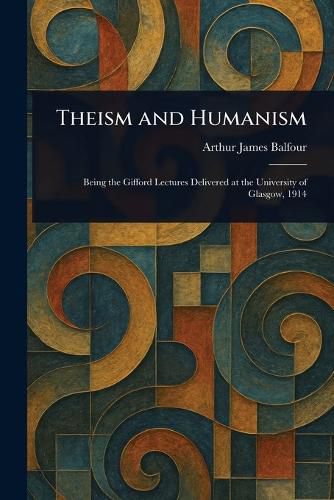Readings Newsletter
Become a Readings Member to make your shopping experience even easier.
Sign in or sign up for free!
You’re not far away from qualifying for FREE standard shipping within Australia
You’ve qualified for FREE standard shipping within Australia
The cart is loading…






This title is printed to order. This book may have been self-published. If so, we cannot guarantee the quality of the content. In the main most books will have gone through the editing process however some may not. We therefore suggest that you be aware of this before ordering this book. If in doubt check either the author or publisher’s details as we are unable to accept any returns unless they are faulty. Please contact us if you have any questions.
"Theism and Humanism" presents Arthur James Balfour's profound exploration of two fundamental worldviews. Derived from the esteemed Gifford Lectures delivered at the University of Glasgow in 1914, this work delves into the philosophical underpinnings of theism and humanism, examining their implications for our understanding of existence, morality, and the human condition.
Balfour, a noted philosopher and statesman, rigorously analyzes the core tenets of both perspectives, offering a nuanced comparison of their strengths and weaknesses. He grapples with fundamental questions about religion, ethics, and the nature of reality, providing a framework for understanding the ongoing dialogue between faith and reason. This book remains a vital contribution to philosophical discourse, offering insights into the enduring tensions between religious belief and secular humanism. A cornerstone of philosophical and religious thought, "Theism and Humanism" continues to provoke and inspire readers interested in the intersection of philosophy and religion.
This work has been selected by scholars as being culturally important, and is part of the knowledge base of civilization as we know it.
This work is in the public domain in the United States of America, and possibly other nations. Within the United States, you may freely copy and distribute this work, as no entity (individual or corporate) has a copyright on the body of the work.
Scholars believe, and we concur, that this work is important enough to be preserved, reproduced, and made generally available to the public. We appreciate your support of the preservation process, and thank you for being an important part of keeping this knowledge alive and relevant.
$9.00 standard shipping within Australia
FREE standard shipping within Australia for orders over $100.00
Express & International shipping calculated at checkout
This title is printed to order. This book may have been self-published. If so, we cannot guarantee the quality of the content. In the main most books will have gone through the editing process however some may not. We therefore suggest that you be aware of this before ordering this book. If in doubt check either the author or publisher’s details as we are unable to accept any returns unless they are faulty. Please contact us if you have any questions.
"Theism and Humanism" presents Arthur James Balfour's profound exploration of two fundamental worldviews. Derived from the esteemed Gifford Lectures delivered at the University of Glasgow in 1914, this work delves into the philosophical underpinnings of theism and humanism, examining their implications for our understanding of existence, morality, and the human condition.
Balfour, a noted philosopher and statesman, rigorously analyzes the core tenets of both perspectives, offering a nuanced comparison of their strengths and weaknesses. He grapples with fundamental questions about religion, ethics, and the nature of reality, providing a framework for understanding the ongoing dialogue between faith and reason. This book remains a vital contribution to philosophical discourse, offering insights into the enduring tensions between religious belief and secular humanism. A cornerstone of philosophical and religious thought, "Theism and Humanism" continues to provoke and inspire readers interested in the intersection of philosophy and religion.
This work has been selected by scholars as being culturally important, and is part of the knowledge base of civilization as we know it.
This work is in the public domain in the United States of America, and possibly other nations. Within the United States, you may freely copy and distribute this work, as no entity (individual or corporate) has a copyright on the body of the work.
Scholars believe, and we concur, that this work is important enough to be preserved, reproduced, and made generally available to the public. We appreciate your support of the preservation process, and thank you for being an important part of keeping this knowledge alive and relevant.